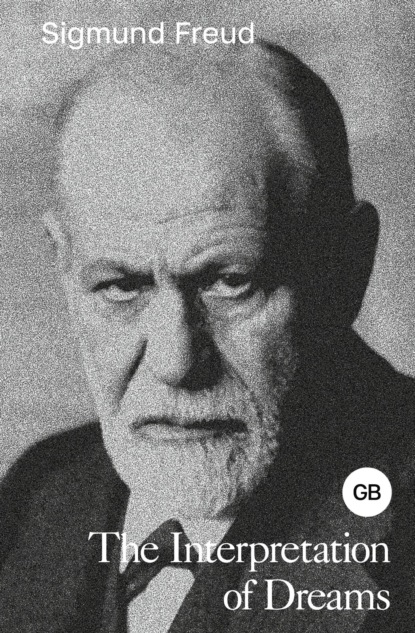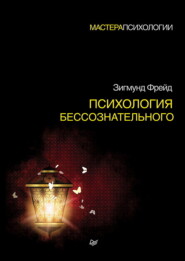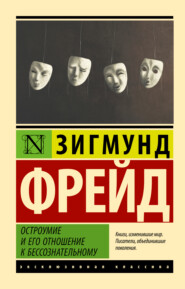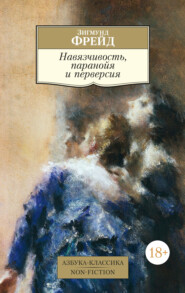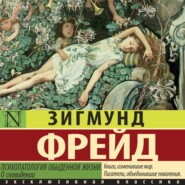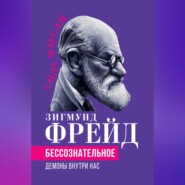По всем вопросам обращайтесь на: info@litportal.ru
(©) 2003-2024.
✖
The Interpretation of Dreams / Толкование сновидений
Настройки чтения
Размер шрифта
Высота строк
Поля
The Interpretation of Dreams / Толкование сновидений
Sigmund Freud
Great books
Пытаетесь понять, почему вам снится английский? Никто не сможет ответить на это лучше Зигмунда Фрейда.
«Толкование сновидений» Зигмунда Фрейда – это классическая книга о символах и смыслах сновидений, обогащенная глубоким анализом психических процессов. В этой книге Фрейд исследует скрытые желания, страхи и конфликты, лежащие в основе снов, расширяя понимание нашего внутреннего мира и того, как он влияет на поведение.
Книга издана без сокращений и адаптации, в переводе А. Брилла. Прикоснитесь к знаменитому труду по психологии на английском языке!
В формате PDF A4 сохранен издательский макет книги.
Sigmund Freud
The Interpretation of Dreams
© ООО «Издательство АСТ», 2024
I
The scientific literature on the problems of the dream[1 - To the first publication of this book, 1900.]
In the following pages I shall prove that there exists a psychological technique by which dreams may be interpreted, and that upon the application of this method every dream will show itself to be a senseful psychological structure which may be introduced into an assignable place in the psychic activity of the waking state. I shall furthermore endeavour to explain the processes which give rise to the strangeness and obscurity of the dream, and to discover through them the nature of the psychic forces which operate, whether in combination or in opposition, to produce the dream. This accomplished, my investigation will terminate, as it will have reached the point where the problem of the dream meets with broader problems, the solution of which must be attempted through other material.
I must presuppose that the reader is acquainted with the work done by earlier authors as well as with the present status of the dream problem in science, since in the course of this treatise I shall not often have occasion to return to them. For, notwithstanding the effort of several thousand years, little progress has been made in the scientific understanding of dreams. This has been so universally acknowledged by the authors that it seems unnecessary to quote individual opinions. One will find in the writings indexed at the end of this book many stimulating observations and plenty of interesting material for our subject, but little or nothing that concerns the true nature of the dream or that solves definitively any of its enigmas. Still less of course has been transmitted to the knowledge of the educated laity.
The first book in which the dream is treated as an object of psychology seems to be that of Aristotle
(Concerning Dreams and their Interpretation). Aristotle asserts that the dream is of demoniacal, though not of divine nature, which indeed contains deep meaning, if it be correctly interpreted. He was also acquainted with some of the characteristics of dream life, e. g., he knew that the dream turns slight sensations perceived during sleep into great ones (“one imagines that one walks through fire and feels hot, if this or that part of the body becomes slightly warmed”), which led him to conclude that dreams might easily betray to the physician the first indications of an incipient change in the body passing unnoticed during the day. I have been unable to go more deeply into the Aristotelian treatise, because of insufficient preparation and lack of skilled assistance.
As every one knows, the ancients before Aristotle did not consider the dream a product of the dreaming mind, but a divine inspiration, and in ancient times the two antagonistic streams, which one finds throughout in the estimates of dream life, were already noticeable. They distinguished between true and valuable dreams, sent to the dreamer to warn him or to foretell the future, and vain, fraudulent, and empty dreams, the object of which was to misguide or lead him to destruction[2 - Compare, on the other hand, O. Gruppe, Griechische Mythologie und Religionsgeschichte, p. 390. “Dreams were divided into two classes; the first were influenced only by the present (or past), and were unimportant for the future: they embraced the ένύπνια, insomnia, which immediately produces the given idea or its opposite, e. g. hunger or its satiation, and the φαντάσµατα, which elaborates the given idea phantastically, as e. g. the nightmare, ephialtes. The second class was, on the other hand, determinant for the future. To this belong: (1) direct prophecies received in the dream (χρηματωμδς, oraculum); (2) the foretelling of a future event (ὅραμα); (3) the symbolic or the dream requiring interpretation (ὅνειρος, somnium). This theory has been preserved for many centuries”.]. This pre-scientific conception of the dream among the ancients was certainly in perfect keeping with their general view of life, which was wont to project as reality in the outer world that which possessed reality only within the mind. It, moreover, accounted for the main impression made upon the waking life by the memory left from the dream in the morning, for in this memory the dream, as compared with the rest of the psychic content, seems something strange, coming, as it were, from another world. It would likewise be wrong to suppose that the theory of the supernatural origin of dreams lacks followers in our own day; for leaving out of consideration all bigoted and mystical authors – who are perfectly justified in adhering to the remnants of the once extensive realm of the supernatural until they have been swept away by scientific explanation – one meets even sagacious men averse to anything adventurous, who go so far as to base their religious belief in the existence and co-operation of superhuman forces on the inexplicableness of the dream manifestations (Haffner
). The validity ascribed to the dream life by some schools of philosophy, e. g. the school of Schelling, is a distinct echo of the undisputed divinity of dreams in antiquity, nor is discussion closed on the subject of the mantic or prophetic power of dreams. This is due to the fact that the attempted psychological explanations are too inadequate to overcome the accumulated material, however strongly all those who devote themselves to a scientific mode of thought may feel that such assertions should be repudiated. To write a history of our scientific knowledge of dream problems is so difficult because, however valuable some parts of this knowledge may have been, no progress in definite directions has been discernible. There has been no construction of a foundation of assured results upon which future investigators could continue to build, but every new author takes up the same problems afresh and from the very beginning. Were I to follow the authors in chronological order, and give a review of the opinions each has held concerning the problems of the dream, I should be prevented from drawing a clear and complete picture of the present state of knowledge on the subject. I have therefore preferred to base the treatment upon themes rather than upon the authors, and I shall cite for each problem of the dream the material found in the literature for its solution.
But as I have not succeeded in mastering the entire literature, which is widely disseminated and interwoven with that on other subjects, I must ask my readers to rest content provided no fundamental fact or important viewpoint be lost in my description.
Until recently most authors have been led to treat the subjects of sleep and dream in the same connection, and with them they have also regularly treated analogous states of psychopathology, and other dreamlike states like hallucinations, visions, etc. In the more recent works, on the other hand, there has been a tendency to keep more closely to the theme, and to take as the subject one single question of the dream life. This change, I believe, is an expression of the conviction that enlightenment and agreement in such obscure matters can only be brought about by a series of detailed investigations. It is such a detailed investigation and one of a special psychological nature, that I would offer here. I have little occasion to study the problem of sleep, as it is essentially a psychological problem, although the change of functional determinations for the mental apparatus must be included in the character of sleep. The literature of sleep will therefore not be considered here.
A scientific interest in the phenomena of dreams as such leads to the following in part interdependent inquiries:
(a) The Relation of the Dream to the Waking State. – The naïve judgment of a person on awakening assumes that the dream – if indeed it does not originate in another world – at any rate has taken the dreamer into another world. The old physiologist, Burdach,
to whom we are indebted for a careful and discriminating description of the phenomena of dreams, expressed this conviction in an often-quoted passage, p. 474: “The waking life never repeats itself with its trials and joys, its pleasures and pains, but, on the contrary, the dream aims to relieve us of these. Even when our whole mind is filled with one subject, when profound sorrow has torn our hearts or when a task has claimed the whole power of our mentality, the dream either gives us something entirely strange, or it takes for its combinations only a few elements from reality, or it only enters into the strain of our mood and symbolises reality.”
L. Strümpell
expresses himself to the same effect in his Nature and Origin of Dreams (p. 16), a study which is everywhere justly held in high respect: “He who dreams turns his back upon the world of waking consciousness” (p. 17). “In the dream the memory of the orderly content of the waking consciousness and its normal behaviour is as good as entirely lost” (p. 19). “The almost complete isolation of the mind in the dream from the regular normal content and course of the waking state…”
But the overwhelming majority of the authors have assumed a contrary view of the relation of the dream to waking life. Thus Haffner
(p. 19): “First of all the dream is the continuation of the waking state. Our dreams always unite themselves with those ideas which have shortly before been in our consciousness. Careful examination will nearly always find a thread by which the dream has connected itself with the experience of the previous day.” Weygandt
(p. 6), flatly contradicts the above cited statement of Burdach: “For it may often be observed, apparently in the great majority of dreams, that they lead us directly back into everyday life, instead of releasing us from it.” Maury
(p. 56), says in a concise formula: “Nous rêvons de ce que nous avons vu, dit, desiré ou fait.” Jessen,
in his Psychology, published in 1855 (p. 530), is somewhat more explicit: “The content of dreams is more or less determined by the individual personality, by age, sex, station in life, education, habits, and by events and experiences of the whole past life.”
The ancients had the same idea about the dependence of the dream content upon life. I cite Radestock
(p. 139): “When Xerxes, before his march against Greece, was dissuaded from this resolution by good counsel, but was again and again incited by dreams to undertake it, one of the old rational dream-interpreters of the Persians, Artabanus, told him very appropriately that dream pictures mostly contain that of which one has been thinking while awake.”
In the didactic poem of Lucretius, De Rerum Natura (IV, v. 959), occurs this passage:-
“Et quo quisque fere studio devinctus adhaeret,
aut quibus in rebus multum sumus ante morati
atque in ea ratione fuit contenta magis mens,
in somnis eadem plerumque videmur obire;
causidici causas agere et componere leges,
induperatores pugnare ac proelia obire,” etc., etc.
Cicero (De Divinatione, II) says quite similarly, as does also Maury much later:-
“Maximeque reliquiae earum rerum moventur in animis et agitantur, de quibus vigilantes aut cogitavimus aut egimus.”
The contradiction expressed in these two views as to the relation between dream life and waking life seems indeed insoluble. It will therefore not be out of place to mention the description of F. W. Hildebrandt
(1875), who believes that the peculiarities of the dream can generally be described only by calling them a “series of contrasts which apparently shade off into contradictions” (p. 8). “The first of these contrasts is formed on the one hand by the strict isolation or seclusion of the dream from true and actual life, and on the other hand by the continuous encroachment of the one upon the other, and the constant dependency of one upon the other. The dream is something absolutely separated from the reality experienced during the waking state; one may call it an existence hermetically sealed up and separated from real life by an unsurmountable chasm. It frees us from reality, extinguishes normal recollection of reality, and places us in another world and in a totally different life, which at bottom has nothing in common with reality…” Hildebrandt then asserts that in falling asleep our whole being, with all its forms of existence, disappears “as through an invisible trap door.” In the dream one is perhaps making a voyage to St. Helena in order to offer the imprisoned Napoleon something exquisite in the way of Moselle wine. One is most amicably received by the ex-emperor, and feels almost sorry when the interesting illusion is destroyed on awakening. But let us now compare the situation of the dream with reality. The dreamer has never been a wine merchant, and has no desire to become one. He has never made a sea voyage, and St. Helena is the last place he would take as destination for such a voyage. The dreamer entertains no sympathetic feeling for Napoleon, but on the contrary a strong patriotic hatred. And finally the dreamer was not yet among the living when Napoleon died on the island; so that it was beyond the reach of possibility for him to have had any personal relations with Napoleon. The dream experience thus appears as something strange, inserted between two perfectly harmonising and succeeding periods.
“Nevertheless,” continues Hildebrandt, “the opposite is seemingly just as true and correct. I believe that hand in hand with this seclusion and isolation there can still exist the most intimate relation and connection. We may justly say that no matter what the dream offers, it finds its material in reality and in the psychic life arrayed around this reality. However strange the dream may seem, it can never detach itself from reality, and its most sublime as well as its most farcical structures must always borrow their elementary material either from what we have seen with our eyes in the outer world, or from what has previously found a place somewhere in our waking thoughts; in other words, it must be taken from what we had already experienced either objectively or subjectively.”
(b) The Material of the Dream. – Memory in the Dream. – That all the material composing the content of the dream in some way originates in experience, that it is reproduced in the dream, or recalled, – this at least may be taken as an indisputable truth. Yet it would be wrong to assume that such connection between dream content and reality will be readily disclosed as an obvious product of the instituted comparison. On the contrary, the connection must be carefully sought, and in many cases it succeeds in eluding discovery for a long time. The reason for this is to be found in a number of peculiarities evinced by the memory in dreams, which, though universally known, have hitherto entirely eluded explanation. It will be worth while to investigate exhaustively these characteristics.
It often happens that matter appears in the dream content which one cannot recognise later in the waking state as belonging to one̕s knowledge and experience. One remembers well enough having dreamed about the subject in question, but cannot recall the fact or time of the experience. The dreamer is therefore in the dark as to the source from which the dream has been drawing, and is even tempted to believe an independently productive activity on the part of the dream, until, often long afterwards, a new episode brings back to recollection a former experience given up as lost, and thus reveals the source of the dream. One is thus forced to admit that something has been known and remembered in the dream that has been withdrawn from memory during the waking state.
Delbœuf
narrates from his own experience an especially impressive example of this kind. He saw in his dream the courtyard of his house covered with snow, and found two little lizards half-frozen and buried in the snow. Being a lover of animals, he picked them up, warmed them, and put them back into a crevice in the wall which was reserved for them. He also gave them some small fern leaves that had been growing on the wall, which he knew they were fond of. In the dream he knew the name of the plant: Asplenium ruta muralis. The dream then continued, returning after a digression to the lizards, and to his astonishment Delbœuf saw two other little animals falling upon what was left of the ferns. On turning his eyes to the open field he saw a fifth and a sixth lizard running into the hole in the wall, and finally the street was covered with a procession of lizards, all wandering in the same direction, etc.
In his waking state Delbœuf knew only a few Latin names of plants, and nothing of the Asplenium. To his great surprise he became convinced that a fern of this name really existed and that the correct name was Asplenium ruta muraria, which the dream had slightly disfigured. An accidental coincidence could hardly be considered, but it remained a mystery for Delbœuf whence he got his knowledge of the name Asplenium in the dream.
The dream occurred in 1862. Sixteen years later, while at the house of one of his friends, the philosopher noticed a small album containing dried plants resembling the albums that are sold as souvenirs to visitors in many parts of Switzerland. A sudden recollection occurred to him; he opened the herbarium, and discovered therein the Asplenium of his dream, and recognised his own handwriting in the accompanying Latin name. The connection could now be traced. While on her wedding trip, a sister of this friend visited Delbœuf in 1860-two years prior to the lizard dream. She had with her at the time this album, which was intended for her brother, and Delbœuf took the trouble to write, at the dictation of a botanist, under each of the dried plants the Latin name.
The favourable accident which made possible the report of this valuable example also permitted Delbœuf to trace another portion of this dream to its forgotten source. One day in 1877 he came upon an old volume of an illustrated journal, in which he found pictured the whole procession of lizards just as he had dreamed it in 1862. The volume bore the date of 1861, and Delbœuf could recall that he had subscribed to the journal from its first appearance.
That the dream has at its disposal recollections which are inaccessible to the waking state is such a remarkable and theoretically important fact that I should like to urge more attention to it by reporting several other “Hypermnesic Dreams.” Maury
relates that for some time the word Mussidan used to occur to his mind during the day. He knew it to be the name of a French city, but nothing else. One night he dreamed of a conversation with a certain person who told him that she came from Mussidan, and, in answer to his question where the city was, she replied: “Mussidan is a principal country town in the Département de La Dordogne.” On waking, Maury put no faith in the information received in his dream; the geographical lexicon, however, showed it to be perfectly correct. In this case the superior knowledge of the dream is confirmed, but the forgotten source of this knowledge has not been traced.
Jessen
Sigmund Freud
Great books
Пытаетесь понять, почему вам снится английский? Никто не сможет ответить на это лучше Зигмунда Фрейда.
«Толкование сновидений» Зигмунда Фрейда – это классическая книга о символах и смыслах сновидений, обогащенная глубоким анализом психических процессов. В этой книге Фрейд исследует скрытые желания, страхи и конфликты, лежащие в основе снов, расширяя понимание нашего внутреннего мира и того, как он влияет на поведение.
Книга издана без сокращений и адаптации, в переводе А. Брилла. Прикоснитесь к знаменитому труду по психологии на английском языке!
В формате PDF A4 сохранен издательский макет книги.
Sigmund Freud
The Interpretation of Dreams
© ООО «Издательство АСТ», 2024
I
The scientific literature on the problems of the dream[1 - To the first publication of this book, 1900.]
In the following pages I shall prove that there exists a psychological technique by which dreams may be interpreted, and that upon the application of this method every dream will show itself to be a senseful psychological structure which may be introduced into an assignable place in the psychic activity of the waking state. I shall furthermore endeavour to explain the processes which give rise to the strangeness and obscurity of the dream, and to discover through them the nature of the psychic forces which operate, whether in combination or in opposition, to produce the dream. This accomplished, my investigation will terminate, as it will have reached the point where the problem of the dream meets with broader problems, the solution of which must be attempted through other material.
I must presuppose that the reader is acquainted with the work done by earlier authors as well as with the present status of the dream problem in science, since in the course of this treatise I shall not often have occasion to return to them. For, notwithstanding the effort of several thousand years, little progress has been made in the scientific understanding of dreams. This has been so universally acknowledged by the authors that it seems unnecessary to quote individual opinions. One will find in the writings indexed at the end of this book many stimulating observations and plenty of interesting material for our subject, but little or nothing that concerns the true nature of the dream or that solves definitively any of its enigmas. Still less of course has been transmitted to the knowledge of the educated laity.
The first book in which the dream is treated as an object of psychology seems to be that of Aristotle
(Concerning Dreams and their Interpretation). Aristotle asserts that the dream is of demoniacal, though not of divine nature, which indeed contains deep meaning, if it be correctly interpreted. He was also acquainted with some of the characteristics of dream life, e. g., he knew that the dream turns slight sensations perceived during sleep into great ones (“one imagines that one walks through fire and feels hot, if this or that part of the body becomes slightly warmed”), which led him to conclude that dreams might easily betray to the physician the first indications of an incipient change in the body passing unnoticed during the day. I have been unable to go more deeply into the Aristotelian treatise, because of insufficient preparation and lack of skilled assistance.
As every one knows, the ancients before Aristotle did not consider the dream a product of the dreaming mind, but a divine inspiration, and in ancient times the two antagonistic streams, which one finds throughout in the estimates of dream life, were already noticeable. They distinguished between true and valuable dreams, sent to the dreamer to warn him or to foretell the future, and vain, fraudulent, and empty dreams, the object of which was to misguide or lead him to destruction[2 - Compare, on the other hand, O. Gruppe, Griechische Mythologie und Religionsgeschichte, p. 390. “Dreams were divided into two classes; the first were influenced only by the present (or past), and were unimportant for the future: they embraced the ένύπνια, insomnia, which immediately produces the given idea or its opposite, e. g. hunger or its satiation, and the φαντάσµατα, which elaborates the given idea phantastically, as e. g. the nightmare, ephialtes. The second class was, on the other hand, determinant for the future. To this belong: (1) direct prophecies received in the dream (χρηματωμδς, oraculum); (2) the foretelling of a future event (ὅραμα); (3) the symbolic or the dream requiring interpretation (ὅνειρος, somnium). This theory has been preserved for many centuries”.]. This pre-scientific conception of the dream among the ancients was certainly in perfect keeping with their general view of life, which was wont to project as reality in the outer world that which possessed reality only within the mind. It, moreover, accounted for the main impression made upon the waking life by the memory left from the dream in the morning, for in this memory the dream, as compared with the rest of the psychic content, seems something strange, coming, as it were, from another world. It would likewise be wrong to suppose that the theory of the supernatural origin of dreams lacks followers in our own day; for leaving out of consideration all bigoted and mystical authors – who are perfectly justified in adhering to the remnants of the once extensive realm of the supernatural until they have been swept away by scientific explanation – one meets even sagacious men averse to anything adventurous, who go so far as to base their religious belief in the existence and co-operation of superhuman forces on the inexplicableness of the dream manifestations (Haffner
). The validity ascribed to the dream life by some schools of philosophy, e. g. the school of Schelling, is a distinct echo of the undisputed divinity of dreams in antiquity, nor is discussion closed on the subject of the mantic or prophetic power of dreams. This is due to the fact that the attempted psychological explanations are too inadequate to overcome the accumulated material, however strongly all those who devote themselves to a scientific mode of thought may feel that such assertions should be repudiated. To write a history of our scientific knowledge of dream problems is so difficult because, however valuable some parts of this knowledge may have been, no progress in definite directions has been discernible. There has been no construction of a foundation of assured results upon which future investigators could continue to build, but every new author takes up the same problems afresh and from the very beginning. Were I to follow the authors in chronological order, and give a review of the opinions each has held concerning the problems of the dream, I should be prevented from drawing a clear and complete picture of the present state of knowledge on the subject. I have therefore preferred to base the treatment upon themes rather than upon the authors, and I shall cite for each problem of the dream the material found in the literature for its solution.
But as I have not succeeded in mastering the entire literature, which is widely disseminated and interwoven with that on other subjects, I must ask my readers to rest content provided no fundamental fact or important viewpoint be lost in my description.
Until recently most authors have been led to treat the subjects of sleep and dream in the same connection, and with them they have also regularly treated analogous states of psychopathology, and other dreamlike states like hallucinations, visions, etc. In the more recent works, on the other hand, there has been a tendency to keep more closely to the theme, and to take as the subject one single question of the dream life. This change, I believe, is an expression of the conviction that enlightenment and agreement in such obscure matters can only be brought about by a series of detailed investigations. It is such a detailed investigation and one of a special psychological nature, that I would offer here. I have little occasion to study the problem of sleep, as it is essentially a psychological problem, although the change of functional determinations for the mental apparatus must be included in the character of sleep. The literature of sleep will therefore not be considered here.
A scientific interest in the phenomena of dreams as such leads to the following in part interdependent inquiries:
(a) The Relation of the Dream to the Waking State. – The naïve judgment of a person on awakening assumes that the dream – if indeed it does not originate in another world – at any rate has taken the dreamer into another world. The old physiologist, Burdach,
to whom we are indebted for a careful and discriminating description of the phenomena of dreams, expressed this conviction in an often-quoted passage, p. 474: “The waking life never repeats itself with its trials and joys, its pleasures and pains, but, on the contrary, the dream aims to relieve us of these. Even when our whole mind is filled with one subject, when profound sorrow has torn our hearts or when a task has claimed the whole power of our mentality, the dream either gives us something entirely strange, or it takes for its combinations only a few elements from reality, or it only enters into the strain of our mood and symbolises reality.”
L. Strümpell
expresses himself to the same effect in his Nature and Origin of Dreams (p. 16), a study which is everywhere justly held in high respect: “He who dreams turns his back upon the world of waking consciousness” (p. 17). “In the dream the memory of the orderly content of the waking consciousness and its normal behaviour is as good as entirely lost” (p. 19). “The almost complete isolation of the mind in the dream from the regular normal content and course of the waking state…”
But the overwhelming majority of the authors have assumed a contrary view of the relation of the dream to waking life. Thus Haffner
(p. 19): “First of all the dream is the continuation of the waking state. Our dreams always unite themselves with those ideas which have shortly before been in our consciousness. Careful examination will nearly always find a thread by which the dream has connected itself with the experience of the previous day.” Weygandt
(p. 6), flatly contradicts the above cited statement of Burdach: “For it may often be observed, apparently in the great majority of dreams, that they lead us directly back into everyday life, instead of releasing us from it.” Maury
(p. 56), says in a concise formula: “Nous rêvons de ce que nous avons vu, dit, desiré ou fait.” Jessen,
in his Psychology, published in 1855 (p. 530), is somewhat more explicit: “The content of dreams is more or less determined by the individual personality, by age, sex, station in life, education, habits, and by events and experiences of the whole past life.”
The ancients had the same idea about the dependence of the dream content upon life. I cite Radestock
(p. 139): “When Xerxes, before his march against Greece, was dissuaded from this resolution by good counsel, but was again and again incited by dreams to undertake it, one of the old rational dream-interpreters of the Persians, Artabanus, told him very appropriately that dream pictures mostly contain that of which one has been thinking while awake.”
In the didactic poem of Lucretius, De Rerum Natura (IV, v. 959), occurs this passage:-
“Et quo quisque fere studio devinctus adhaeret,
aut quibus in rebus multum sumus ante morati
atque in ea ratione fuit contenta magis mens,
in somnis eadem plerumque videmur obire;
causidici causas agere et componere leges,
induperatores pugnare ac proelia obire,” etc., etc.
Cicero (De Divinatione, II) says quite similarly, as does also Maury much later:-
“Maximeque reliquiae earum rerum moventur in animis et agitantur, de quibus vigilantes aut cogitavimus aut egimus.”
The contradiction expressed in these two views as to the relation between dream life and waking life seems indeed insoluble. It will therefore not be out of place to mention the description of F. W. Hildebrandt
(1875), who believes that the peculiarities of the dream can generally be described only by calling them a “series of contrasts which apparently shade off into contradictions” (p. 8). “The first of these contrasts is formed on the one hand by the strict isolation or seclusion of the dream from true and actual life, and on the other hand by the continuous encroachment of the one upon the other, and the constant dependency of one upon the other. The dream is something absolutely separated from the reality experienced during the waking state; one may call it an existence hermetically sealed up and separated from real life by an unsurmountable chasm. It frees us from reality, extinguishes normal recollection of reality, and places us in another world and in a totally different life, which at bottom has nothing in common with reality…” Hildebrandt then asserts that in falling asleep our whole being, with all its forms of existence, disappears “as through an invisible trap door.” In the dream one is perhaps making a voyage to St. Helena in order to offer the imprisoned Napoleon something exquisite in the way of Moselle wine. One is most amicably received by the ex-emperor, and feels almost sorry when the interesting illusion is destroyed on awakening. But let us now compare the situation of the dream with reality. The dreamer has never been a wine merchant, and has no desire to become one. He has never made a sea voyage, and St. Helena is the last place he would take as destination for such a voyage. The dreamer entertains no sympathetic feeling for Napoleon, but on the contrary a strong patriotic hatred. And finally the dreamer was not yet among the living when Napoleon died on the island; so that it was beyond the reach of possibility for him to have had any personal relations with Napoleon. The dream experience thus appears as something strange, inserted between two perfectly harmonising and succeeding periods.
“Nevertheless,” continues Hildebrandt, “the opposite is seemingly just as true and correct. I believe that hand in hand with this seclusion and isolation there can still exist the most intimate relation and connection. We may justly say that no matter what the dream offers, it finds its material in reality and in the psychic life arrayed around this reality. However strange the dream may seem, it can never detach itself from reality, and its most sublime as well as its most farcical structures must always borrow their elementary material either from what we have seen with our eyes in the outer world, or from what has previously found a place somewhere in our waking thoughts; in other words, it must be taken from what we had already experienced either objectively or subjectively.”
(b) The Material of the Dream. – Memory in the Dream. – That all the material composing the content of the dream in some way originates in experience, that it is reproduced in the dream, or recalled, – this at least may be taken as an indisputable truth. Yet it would be wrong to assume that such connection between dream content and reality will be readily disclosed as an obvious product of the instituted comparison. On the contrary, the connection must be carefully sought, and in many cases it succeeds in eluding discovery for a long time. The reason for this is to be found in a number of peculiarities evinced by the memory in dreams, which, though universally known, have hitherto entirely eluded explanation. It will be worth while to investigate exhaustively these characteristics.
It often happens that matter appears in the dream content which one cannot recognise later in the waking state as belonging to one̕s knowledge and experience. One remembers well enough having dreamed about the subject in question, but cannot recall the fact or time of the experience. The dreamer is therefore in the dark as to the source from which the dream has been drawing, and is even tempted to believe an independently productive activity on the part of the dream, until, often long afterwards, a new episode brings back to recollection a former experience given up as lost, and thus reveals the source of the dream. One is thus forced to admit that something has been known and remembered in the dream that has been withdrawn from memory during the waking state.
Delbœuf
narrates from his own experience an especially impressive example of this kind. He saw in his dream the courtyard of his house covered with snow, and found two little lizards half-frozen and buried in the snow. Being a lover of animals, he picked them up, warmed them, and put them back into a crevice in the wall which was reserved for them. He also gave them some small fern leaves that had been growing on the wall, which he knew they were fond of. In the dream he knew the name of the plant: Asplenium ruta muralis. The dream then continued, returning after a digression to the lizards, and to his astonishment Delbœuf saw two other little animals falling upon what was left of the ferns. On turning his eyes to the open field he saw a fifth and a sixth lizard running into the hole in the wall, and finally the street was covered with a procession of lizards, all wandering in the same direction, etc.
In his waking state Delbœuf knew only a few Latin names of plants, and nothing of the Asplenium. To his great surprise he became convinced that a fern of this name really existed and that the correct name was Asplenium ruta muraria, which the dream had slightly disfigured. An accidental coincidence could hardly be considered, but it remained a mystery for Delbœuf whence he got his knowledge of the name Asplenium in the dream.
The dream occurred in 1862. Sixteen years later, while at the house of one of his friends, the philosopher noticed a small album containing dried plants resembling the albums that are sold as souvenirs to visitors in many parts of Switzerland. A sudden recollection occurred to him; he opened the herbarium, and discovered therein the Asplenium of his dream, and recognised his own handwriting in the accompanying Latin name. The connection could now be traced. While on her wedding trip, a sister of this friend visited Delbœuf in 1860-two years prior to the lizard dream. She had with her at the time this album, which was intended for her brother, and Delbœuf took the trouble to write, at the dictation of a botanist, under each of the dried plants the Latin name.
The favourable accident which made possible the report of this valuable example also permitted Delbœuf to trace another portion of this dream to its forgotten source. One day in 1877 he came upon an old volume of an illustrated journal, in which he found pictured the whole procession of lizards just as he had dreamed it in 1862. The volume bore the date of 1861, and Delbœuf could recall that he had subscribed to the journal from its first appearance.
That the dream has at its disposal recollections which are inaccessible to the waking state is such a remarkable and theoretically important fact that I should like to urge more attention to it by reporting several other “Hypermnesic Dreams.” Maury
relates that for some time the word Mussidan used to occur to his mind during the day. He knew it to be the name of a French city, but nothing else. One night he dreamed of a conversation with a certain person who told him that she came from Mussidan, and, in answer to his question where the city was, she replied: “Mussidan is a principal country town in the Département de La Dordogne.” On waking, Maury put no faith in the information received in his dream; the geographical lexicon, however, showed it to be perfectly correct. In this case the superior knowledge of the dream is confirmed, but the forgotten source of this knowledge has not been traced.
Jessen





